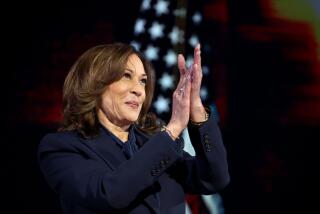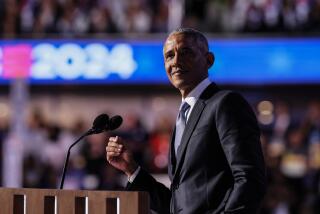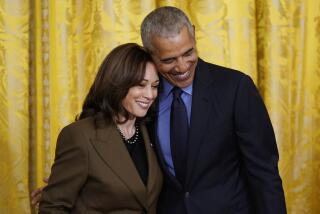Do we have too much faith in Obama?
Today’s question: Are the public’s expectations about Barack Obama and the economy setting him up for failure? Given the latest numbers, could any president come out unscathed? Previously, Lilly and Weigel discussed Obama’s relationship with labor unions, possible futures for Hillary Clinton and Arnold Schwarzenegger in the Obama administration, potential Cabinet picks and Rahm Emanuel’s selection as chief of staff.
Economic recovery and healthcare reform are battles Obama can’t afford to lose
Point: Scott Lilly
The extraordinary celebrations that occurred in the U.S. and around the world in the wake of Barack Obama’s victory have raised the question of whether too much is being expected of one man, even if that man will have the most powerful job on the planet. My view is that the American people have a pretty sober assessment of the trouble we face and the steps that will be necessary to recover.
An Associated Press poll taken earlier this week showed 72% of Americans think Obama “will make the changes needed to revive the stalling economy. The number of people who feel the country is now headed in the “right direction” doubled from the previous survey taken only one week earlier. But the portion of those surveyed who think we are headed in the “right direction” was still only 36%, while 56% continued to respond “wrong direction.”
The economic landscape faced by the new administration is both uncertain and bleak. It is uncertain because no one at this point knows the depths of the problems facing our financial system and what additional steps will be required to correct those problems. It is bleak because once we restore the ability of banks, insurance companies and other financial institutions to function normally, we will still be facing a free fall in household consumption as wages remain stagnant, unemployment lurches higher and household debt remains at unmanageable levels. Declining consumption will in turn weaken earnings and push unemployment higher.
If this downturn is to be reversed in the first few years of the Obama administration, steps must immediately be taken to revive household income and consumption. The federal government will have to pump hundreds of billions of dollars into job-creation programs and provide some tax breaks. Such action will require deficits in the next few years that would have been unimaginable as recently as last year. These will not be easy choices, but the alternative will not simply be continued economic stagnation but a further downward spiral in employment, consumption and business failure. Absent activist government policy, the nation could very possibly revisit the 10%-plus unemployment rates of the early 1980s.
Unfortunately, the economy is not the only challenge facing this administration. Closely connected to the economy is the reform of our healthcare system -- reform that has been successfully thwarted by entrenched interests for the past 60 years but can no longer be postponed. Our healthcare system is a root cause of the weakness of American industry’s competitiveness in world markets. It is the central force that drives government spending upward and increases the size of our deficits. It leaves tens of millions of our citizens without adequate coverage and millions of other families at risk of financial catastrophe in the event that an uninsured loved one were to be struck by a severe illness or injury.
Obama has a plan to address those problems and he should have the votes in Congress to make that plan law. He should not waste any time in asking Congress to expedite consideration of sweeping changes to the nation’s healthcare system. This is the one battle that the new president cannot afford to loose.
Scott Lilly, a senior fellow at the Center for American Progress Action Fund, has served in numerous posts for members of Congress and the Democratic Party.
The political stars are aligned for Obama
Counterpoint: David Weigel
Scott,
The winner of a presidential election usually comes in with some kind of victory bounce en route to a political honeymoon. But the trust people are putting in Obama is really extraordinary. It’s not just a sigh of relief that President Bush is on his way out or that Obama is going to appoint the right people.
I was outside the Rev. Martin Luther King Jr.’s old church in Atlanta, Ebenezer Baptist Church, on election night. I watched an impromptu block party break out, with white and black Georgians hugging and dancing to R. Kelly songs. My neighborhood in Washington probably isn’t the best barometer for the country at large -- we gave Obama 93% of our vote -- but the enthusiasm I see for Obama, still, is incomparable. A local art shop has a booth on the sidewalk already selling Obama inaugural kitsch. Ten days after the election, I’m still seeing people wearing “I voted” stickers out of sheer pride in the man they put in office.
If anything, I’m more optimistic than you, Scott, about Obama’s chances -- not at solving our problems, per se, but at getting credit for what goes right and remaining politically popular. The exit polls can sooth his worries. Most voters (71%) expected their taxes to go up under an Obama administration. Most people (51%) said “government should do more” to solve their problems. So Americans are expecting to sacrifice at the start of the new administration just as Obama asked them to in his victory speech. The fact that a lot of these people won’t see a hike in their income tax is going to sooth them for a while longer. I operated on the assumption that people like divided government, but this week’s CNN poll showing 59% of people comfortable with Democratic control of Washington put the lie to that. People like Obama and they are going to cut him slack.
How is the economic crisis going to limit him? I don’t think it will. As you say, Obama and the Democrats are going to whistle past the debt clock and spend us out of the recession. They will pass as many industry bailouts as they can summon the political will for (plenty of them). And they will do this while providing some tax cuts because every experience we’ve had with economic recessions tells us that’s how you attack them. This is a nightmare for libertarians, but there are no Rothbardians in foxholes.
The crisis is going to complicate our healthcare debate, but I don’t think it’s going to prevent it from happening. Obama will have at least 58 Democratic senators, sympathy for Sen. Ted Kennedy (who has called universal healthcare “the cause of my life”) and a national panic over healthcare costs greasing the skids for his plan. If Obama’s plan follows the lines of this week’s proposal by Montana Sen. Max Baucus, which sets up a Health Insurance Exchange market that would pit private and public insurance providers against each other, it’s going to cost less than the plan conservatives and the McCain campaign demagogued this year. And expectations like that will matter.
I don’t think you and I have talked much about the Iraq war. The reason for that, of course, is that the United States has basically completed its military objectives. During the campaign, Obama talked about the $12 billion a month the U.S. is spending in Iraq, contrasting it with the money the Bush administration was not spending at home. If Obama actually gets the chance to draw down troops (committing some to a less-expensive mission in Afghanistan), there’s an expense he doesn’t have to worry as much about and a confidence-building political victory he’ll have early in his administration. Richard Nixon got to sign the plaque that John F. Kennedy’s astronauts put on the moon, and Obama will probably be able to plant the flag Bush sewed in Iraq.
This is a strange way to close this Dust-Up: I believe I’m giving Obama a better chance of political and policy success than you are, Scott. The truth is that liberal policy thrives in a crisis, and we’re in a crisis. Democrats can bungle the opportunities if they’re not smart, but this week has given us more evidence that Obama is extremely canny. Do I hope that he includes as many libertarians as possible in his administration and his decision-making? Yes. I think that would bolster and enhance what I expect to be a lucky first 100 days.
David Weigel is an associate editor at Reason magazine, where he writes a column on national politics.
More to Read
A cure for the common opinion
Get thought-provoking perspectives with our weekly newsletter.
You may occasionally receive promotional content from the Los Angeles Times.










